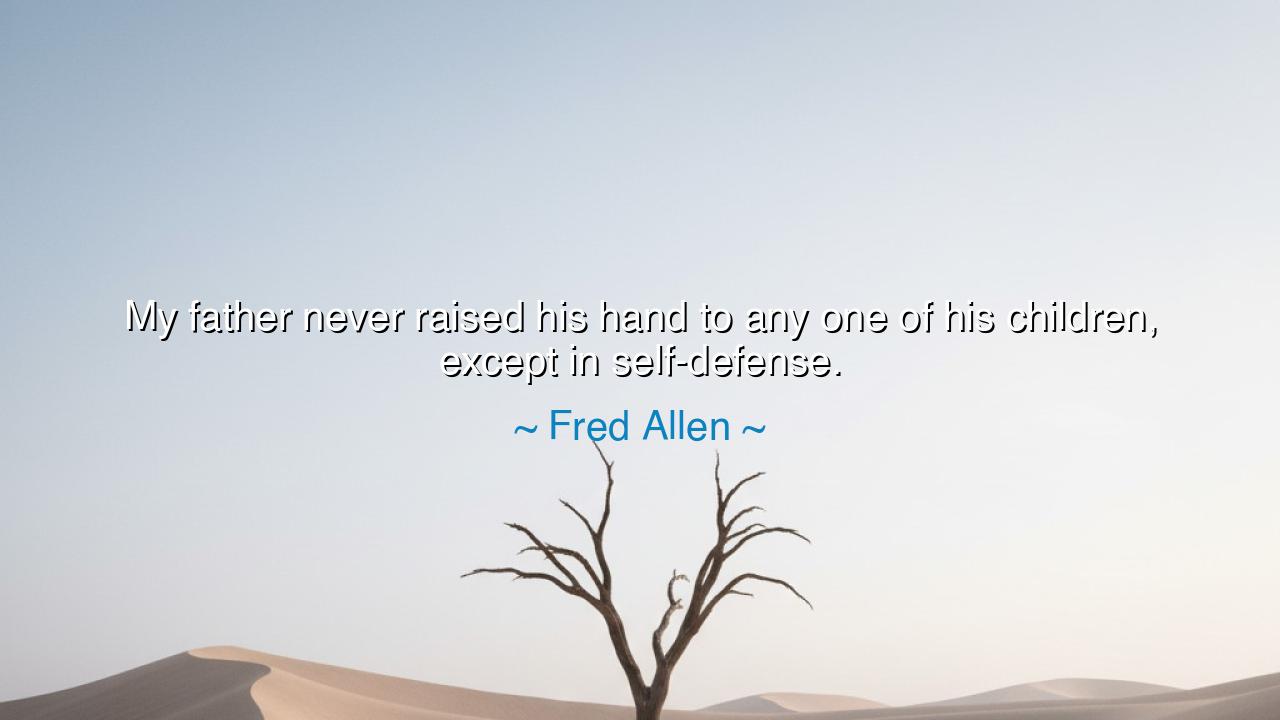
My father never raised his hand to any one of his children






In the quiet humor and hidden wisdom of Fred Allen, a master of wit and reflection, we find a saying that reveals far more than laughter: “My father never raised his hand to any one of his children, except in self-defense.” Though born from jest, this line contains a truth profound and human. Beneath its surface glimmers an image of fatherly restraint, of love wrapped in humor, and of the delicate balance between strength and gentleness that defines the highest form of parenthood. Allen, known for his sharp tongue and tender heart, paints here a portrait not merely of his father, but of the ideal father—one whose power is measured by mercy, and whose might lies in his refusal to harm.
The meaning of this quote unfolds like a parable: a father’s hand, though strong enough to strike, is used only to protect, never to wound. The jest about “self-defense” suggests a family alive with mischief, a home where laughter often tested patience—but where love always triumphed over anger. It is the humor of a man looking back with affection upon his childhood, seeing in his father’s restraint not weakness, but wisdom. In this, Fred Allen reminds us that discipline need not come from violence; it can spring instead from presence, from understanding, from the quiet authority of compassion.
To grasp the deeper root of Allen’s thought, we must look to the nature of true strength. The ancients taught that power ungoverned by virtue is tyranny. The philosopher Seneca, writing to the fathers of Rome, urged them to rule their households not by fear but by reason, saying, “The spirit cannot be guided by blows; it must be led by example.” Likewise, Allen’s father, through humor and restraint, embodies the Stoic ideal: the man who conquers his own temper is mightier than the one who conquers cities. His self-control becomes the measure of his love, and his restraint, the proof of his strength.
History too offers its mirrors. Consider Abraham Lincoln, whose life was filled with trials and the weight of authority. In times of great anger—when insulted, betrayed, or mocked—he rarely retaliated. He once said, “I destroy my enemies when I make them my friends.” Like Allen’s father, he raised his hand only in self-defense, not of ego, but of principle. In Lincoln’s gentleness there was no weakness; rather, there was the quiet majesty of a soul that understood that kindness, when given in the face of provocation, is the highest form of courage.
Fred Allen’s humor, then, becomes a vessel of wisdom. In a single jest, he reveals what many fail to learn in a lifetime: that love guided by patience is the true inheritance of the strong. The father who never strikes, even when provoked, teaches by silence what words could never achieve. He shows his children that power restrained by conscience becomes tenderness. Such a home, built on laughter rather than fear, forms hearts capable of compassion and minds attuned to peace. Through such love, the father defends not himself, but the future of his children.
Yet there is also humility in Allen’s memory. By saying his father struck only in “self-defense,” he hints at the universal truth that children test their parents—that love, to be real, must endure trial. Every parent faces moments when anger tempts the hand, when frustration clouds the heart. But to pause, to breathe, to choose patience over punishment—this is the victory that defines the wise. It is not an easy path, but it is the noble one. And in walking it, the parent protects both the child and the sanctity of their own soul.
So let this saying stand not merely as a jest, but as a teaching for the generations. Let every father, every mother, remember: the hand that nurtures must never become the hand that harms. Raise your hand not in anger, but in guidance; not in vengeance, but in defense of what is good and just. Laugh often, forgive quickly, and rule your home not with fear, but with love wrapped in discipline and discipline softened by love. For as Fred Allen reminds us, the truest strength a parent can show is the strength to protect—never to destroy.
And so, children of the present age, remember this wisdom of the past: gentleness is the armor of the strong. A parent’s humor, patience, and open heart build legacies that endure long after the laughter fades. May every hand that has power also have mercy, and may every home, like Allen’s, be defended not by wrath, but by the unshakable power of love.






AAdministratorAdministrator
Welcome, honored guests. Please leave a comment, we will respond soon